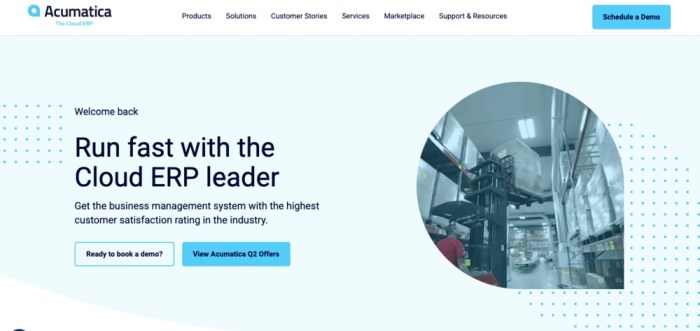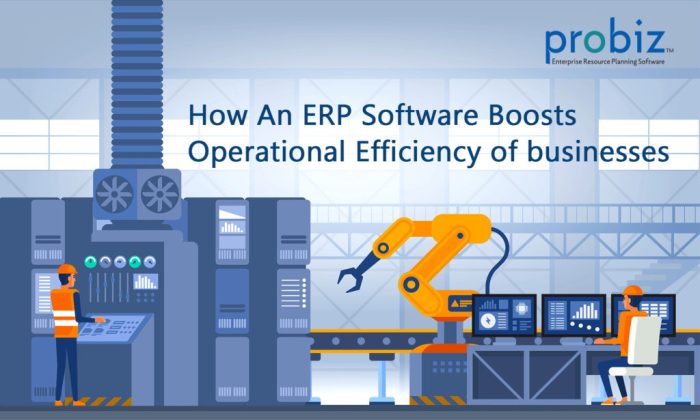Top ERP software for streamlining business operations – Enterprise Resource Planning (ERP) software has become indispensable for businesses of all sizes seeking to streamline operations, improve efficiency, and gain a competitive edge. A robust ERP system integrates various business functions, from finance and human resources to supply chain management and customer relationship management (CRM), onto a single platform. This centralized approach eliminates data silos, improves data accuracy, and facilitates better decision-making.
Choosing the right ERP software, however, can be a daunting task, given the plethora of options available. This comprehensive guide explores the top ERP software solutions currently on the market, highlighting their key features and benefits to help you make an informed decision.
Understanding Your ERP Needs: A Crucial First Step
Before diving into specific software solutions, it’s crucial to assess your business’s unique needs and requirements. Consider the following factors:
- Industry-Specific Requirements: Different industries have unique operational needs. A manufacturing ERP system will differ significantly from one designed for retail or healthcare.
- Business Size and Complexity: Small businesses may require a simpler, cloud-based solution, while larger enterprises might need a more comprehensive, on-premise system with extensive customization options.
- Budgetary Constraints: ERP software costs vary widely, depending on the features, deployment model (cloud vs. on-premise), and vendor support.
- Integration Capabilities: The ERP system should seamlessly integrate with existing business applications, such as CRM, e-commerce platforms, and other specialized software.
- Scalability and Future Growth: Choose a system that can adapt to your business’s evolving needs and accommodate future growth.
Top ERP Software Solutions: A Detailed Overview: Top ERP Software For Streamlining Business Operations
The market offers a diverse range of ERP software solutions catering to different needs and budgets. Here are some of the leading contenders:
1. SAP S/4HANA
SAP S/4HANA is a leading ERP system known for its comprehensive functionality and scalability. It’s particularly well-suited for large enterprises with complex operations. Key features include advanced analytics, real-time data processing, and robust integration capabilities. However, its high cost and complexity can be a barrier for smaller businesses.
2. Oracle NetSuite
Oracle NetSuite is a cloud-based ERP solution popular for its flexibility and ease of use. It offers a wide range of modules, including financials, CRM, and supply chain management, making it suitable for businesses of various sizes. Its cloud-based nature ensures accessibility and scalability, but customization options might be limited compared to on-premise solutions.
3. Microsoft Dynamics 365
Microsoft Dynamics 365 is a modular ERP system that allows businesses to choose the modules they need. Its integration with other Microsoft products, such as Office 365 and Azure, is a significant advantage. It offers a good balance between functionality and ease of use, making it suitable for businesses of different sizes and industries. However, the modular approach can lead to increased complexity if many modules are implemented.

Source: happay.com
4. Infor CloudSuite, Top ERP software for streamlining business operations
Infor CloudSuite offers industry-specific ERP solutions tailored to the needs of various sectors, including manufacturing, healthcare, and retail. Its focus on industry-specific functionality makes it a strong choice for businesses seeking a solution optimized for their particular industry. The customization options are generally robust, but the learning curve can be steeper than for some other solutions.
5. Epicor ERP
Epicor ERP is a widely used system known for its strength in manufacturing and distribution. It provides comprehensive functionalities for managing the entire supply chain, from procurement to production to delivery. Its strong focus on manufacturing makes it less suitable for businesses outside this sector, but within its niche, it excels.
Choosing the Right ERP Software: Key Considerations
Selecting the right ERP software requires careful evaluation of several factors:
- Deployment Model: Cloud-based ERP offers accessibility and scalability, while on-premise solutions provide greater control and customization.
- Implementation Costs: Consider not only the software license but also implementation, customization, training, and ongoing maintenance costs.
- Vendor Support: Choose a vendor with a strong track record of providing reliable support and maintenance.
- User Experience: The software should be intuitive and easy to use for all employees.
- Scalability and Flexibility: The system should be able to adapt to your business’s growth and changing needs.
Frequently Asked Questions (FAQ)
- Q: What is the average cost of ERP software? A: The cost varies significantly depending on the vendor, features, and deployment model. Expect to invest anywhere from a few thousand dollars to millions of dollars for large enterprise solutions.
- Q: How long does it take to implement ERP software? A: Implementation timelines vary depending on the complexity of the system and the size of the business. It can range from a few months to over a year.
- Q: What are the benefits of cloud-based ERP? A: Cloud-based ERP offers accessibility, scalability, cost-effectiveness, and reduced IT infrastructure requirements.
- Q: What are the benefits of on-premise ERP? A: On-premise ERP offers greater control, customization options, and potentially better security for highly sensitive data.
- Q: How can I choose the right ERP vendor? A: Consider factors like vendor reputation, industry experience, support services, and the overall fit with your business needs.
Conclusion
Implementing the right ERP software can significantly streamline business operations, improve efficiency, and enhance decision-making. By carefully assessing your business needs and evaluating the various solutions available, you can choose an ERP system that will support your growth and success. Remember to consider factors such as deployment model, cost, vendor support, and user experience to make an informed decision.
Don’t hesitate to seek professional advice if needed.
Call to Action
Ready to transform your business operations with a powerful ERP solution? Contact us today for a free consultation to discuss your specific needs and explore the best options for your organization.
Question Bank
What is the average cost of implementing ERP software?
The cost varies greatly depending on the size of the business, the chosen software, and the level of customization required. Expect a wide range, from thousands to millions of dollars.
How long does it typically take to implement ERP software?

Source: probizerp.com
Implementation timelines depend on factors like system complexity and company size. Projects can range from a few months to over a year.
What are the key considerations when choosing ERP software?
Key considerations include scalability, integration capabilities, user-friendliness, vendor support, and the software’s ability to meet specific business needs.
What are the potential risks associated with ERP implementation?
Potential risks include cost overruns, project delays, data migration issues, and resistance to change from employees.
